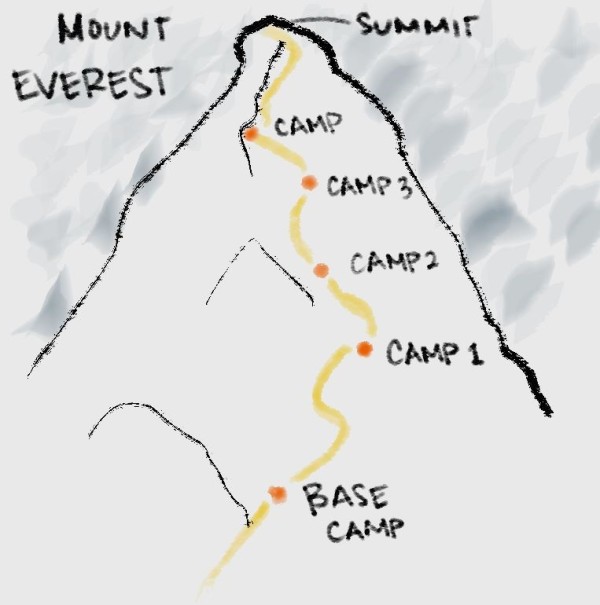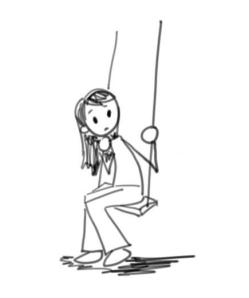If you had to point in the direction of progress, which direction would you point? If you had to draw it on a piece of paper, what would it look like? It might look like an arrow pointing to the right, or diagonally up and to the right. Forward. Onward. Upward.
Alison Levine, a woman who has climbed to the highest peak on every continent and skied to both the north and south poles, thinks differently. Alison was sharing some of the leadership lessons she learned from climbing Mount Everest at yesterday’s Invent Your Future conference in Silicon Valley.
There are multiple camps along the path to the summit, but Alison explained that climbing to the top is not a matter of starting at the bottom and then progressively climbing higher and higher, stopping at each subsequent camp. In fact, it looks more like this.
So, even though the objective is to climb to the top, a significant proportion of your time is spent going back down to basecamp. The first time you reach one of the camps, the purpose is to help your body acclimate itself to the altitude. But, at that altitude, the human body begins deteriorating, so you need to go back down to base camp in order to rest and regain your strength to climb even higher.
“Even though you are going backwards, you are still making progress.”
This is a difficult lesson to digest for those who are used to always moving onward and upward. My clients often talk about how they are dissatisfied with their lack of forward movement, want to make the best use of their time, or don’t want to waste their time.
It may sound counter-intuitive to have to climb back down the mountain after reaching each camp. But it is only counter-intuitive if you think that reaching the summit is the singular objective. However, there is another, more important objective in play: to stay alive, both before and after reaching the summit. When you bring that objective into focus, taking the time to keep climbing back down to basecamp makes sense.
Sometimes we Type-A folks forget that there are other objectives in play. It’s easy to cling to objectives that are visible and measurable, like ascending titles, degrees earned, or salary. It can be more difficult to retain a focus on other objectives like health, fulfillment, and nurturing our relationships with loved ones, until we are sick, unhappy, or painfully absent.
So, if you don’t feel like you’re moving forward, I encourage you to take some time to examine your objectives. Ask yourself:
1) What is the objective you don’t feel like you’re making progress against?
Is the way you’re currently spending your time helping to make you better able to achieve that objective? (If not, then ask)
2) Is that truly the only goal you are working toward right now? What are the other things that are important to you?
Is what you’re doing now fulfilling these other areas of your life that are important? (If not, then ask:)
3) What can you do right now to nurture your ability to achieve any of these objectives going forward?
“Progress is not just one direction. It can happen in many different directions.” It really depends on your objective, that thing which you are trying to achieve. And, it depends on what you need personally to cultivate the strength to go after your goals.
Want to read more about Alison’s lessons learned from climbing Mt. Everest? Check out her book, On The Edge: The Art of High-Impact Leadership









